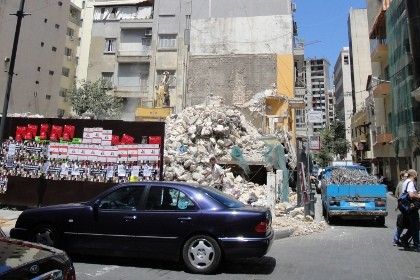Cristina Rotaru
Planning a trip in its finest detail might seem like a safe bet, but sometimes you have to leave some space for the unpredictable, because, whether you like it or not, it’s bound to happen at some point. Lebanon has been the subject of many a good talk, ever since its five provinces have been mandated to France following the collapse of the Ottoman empire. It is still the subject of modern controversial discussions regarding its current political and social status, and rumor has it that touristic visits to Lebanon at this time should be avoided at any cost. In fact, it’s much more than just rumors. A quick visit to the New Zealand National Security website will tell you all of this officially: Lebanon has a code red concerning personal safety. But there has to be more to the city of Beirut than just military stations and restrictions. After all, they didn’t name it “Paris of the Middle East” for nothing.
Beirut is the capital of Lebanon with 1.5 million inhabitants (estimated in 2003). It rests on two hills, making up respectively East and West Beirut, making up a triangular peninsula and allowing a comparatively flat area compared to the rising mountains in the East. Beirut has long been one of the most important commercial and financial centres of the Levant and Middle East, but this era of relative prosperity ended in 1975 when the Lebanese Civil War broke out throughout the country. During most of the war, Beirut was divided between a Muslim West part and the Christian East. In recent years, the South of the city has been controlled by the much debated Hezbollah and target of destructive violent attacks during the 2006 Civil War. Moreover, 3 of the 12 official Palestinian refugee camps are located here. The Downtown area, previously the home of much of the city’s commercial and cultural activities, became a no man’s land known as the “Green Line” during the War, and many of the district’s buildings were damaged or completely destroyed. Despite all of this, local businessmen are rapidly returning to the international arena, and a tour through Downtown Beirut will argue just that: the city is thriving, building and re-building its foundations. This reconstruction of downtown Beirut has been largely driven by Solidere, a development company established in 1994 by Rafik Hariri, Lebanon’s former prime minister. His assassination near the Saint-Georges Bay in 2005 shook the entire country and led to the so-called “Cedar Revolution”, when more than 1 million people gathered for an opposition rally nearly one month after his death. Since then, the recent of events of 2008 when the government decided to disband the Hezbollah network of communication led to significant violence as well, and in present times there is still no telling when and where an attack can occur.
In order to be flexible yourself you should travel with flexible people, who you know will not have a nervous breakdown when you take the rash decision of taking an overnight taxi from Damascus to Beirut without even knowing if you will be able to get a visa or how much it will cost. You can feel quite a bit mentally harassed when there are 20 Arabs trying to convince you that the Beirut they are taking you is far better than where the others will take you. However difficult it may seem in the given circumstances, we managed to get a good price and sealed the deal. Our driver’s ego seemed to be boosting with confidence as he drove past his friends who weren’t lucky enough to get customers that night, but he had difficulties in expressing himself due to insufficient English language skills. For some strange reason we didn’t understand, he thought it to be normal to pick up another man of about 50 years in age, just like himself, and drive him to Lebanon as well. I guess their friendship was so strong that he was even willing to share the driver’s seat with him behind the wheel, and, despite our desperation, cross the border in this way. What we thought would be suppressed by border officials turned out to be not only tolerated, but even rewarded with some potato chips, so we just accepted our fate and stopped trying to ask unnecessary questions.
Our initial intention was to arrive in Beirut just in time for the sunrise and enjoy the whole following day, but because of our driver’s need for speeding, we got there much earlier. We decided to tell him to drop us off in front of a hostel we knew about, because explaining the fact that we have no actual place to sleep that night would have cost us too much trouble. They say that the first impression is the one that stays in your mind for a long time to come. Normally I don’t agree with this affirmation, but in this case I must admit that it couldn’t be closer to the truth. The ensemble picture was this: four girls with their backpacks were roaming the streets of Beirut at 3 in the morning, waiting for the sun to go up or at least trying to find an after-hours place where we would feel protected. The streets of Beirut city at night are a sight to remember: entirely empty, apart from the police armed with shotguns of a size that shouts “authority” out loud and some army trucks driving by every now and then, making you wonder where they are coming from or where they are going. It is quite a terrifying feeling, not having any place to go in a city where there is no telling when civil war will break out, and this uncertainty is certainly something really powerful we experienced as tourists. I remember thinking that the people who live here day by day must experience something much more intense. Or at least this is what I thought.
As the sun rose we came out of our hiding place we finally found and waited for the hour to grow longer in order to call our provisory host who had promised us accommodation for the following nights. Rani Edu is a 27 year old young man I found on a web platform called Couchsurfing. The idea of this project is quite simple: you create an account, register with your name and basic personal information and make your home available for other members such as yourself to come and sleep for free in your home, so that maybe when you travel others will return the favor. It is a traveler’s dream, not only spending some nights in foreign cities for free, but also meeting people who share your interests (because you can read it on their profiles in advance, which saves a whole lot of time) and could potentially become your friends. People whose couches you’ve surfed and those who spent some nights sleeping on yours can afterwards write reviews on your profile, so that a certain degree of trust is achieved if you become a certified member of this community. The interconnectivity provided by the modern era seems to be quite popular in Lebanon, and Rani was one of the many who agreed to allow us to surf his sofa. He lives the high life of Beirut, and our shock was not small when, after having spent a sleepless night on the streets, he picked us up in his shiny brand new BMW to take us to our new home. He tells us that he still lives with his mother and his older brother, but they are fine with us staying there.
Rani graduated from the American University of Beirut after having studied Administration and Business and then decided to make his Masters degree in New York City, where he spent two years in the time of the civil war. It became quite obvious at this time that his family is wealthy, but nothing compares to the site of his home. The luxurious apartment he was living in and the early 20th century vintage sofa we were supposed to sleep on, gave couchsurfing a whole new meaning. It turns out that both he and his brother Dani, who owns a brand new BMW as well, work in their father’s company, and that they enjoy Beirut every second of their lives and wouldn’t like to live anywhere else. Not even in New York.
The people in West Beirut walk around in shops and dine in restaurants and go out in bars for all eyes to witness. The whole city is like a giant catwalk, some sort of urban fashion parade of the rich and famous. Locals are not very interested in talking to you, except perhaps for those who feel that they need to share their life’s story with someone. As such, there was an old woman who approached us for no reason as we were buying coffee and felt obliged to confide in us. She confessed that when she had been working for France Presse news agency, back in the 19’/50s, she had everything she ever dreamed of: she stayed in the best hotels in the world and met everyone who was anyone at that time. This woman had witnessed the transformation of her country and wasn’t able to do anything about it. Her eyes were piercing ours as she delighted us with stories about French ambassadors for something like 30 minutes, but somehow I got the impression that they were far away in distant lands, gazing upon anything else rather than present day Beirut.
Even sightseeing in Beirut is a disturbing activity. On the one hand there are all the luxury hotels, designer shops, fancy cars and beauty shops, which remind one of the glamour from the good old days and on the other hand you can still see completely wrecked and forsaken buildings from the two wars in 1982 and 2006. It is as if all these people are living in a world far away from this whole conflict zone, with their plastic surgery, miniskirts and high heels and do not even see all the military patronizing the city stoically every five meters. Beirut is a torn city, torn between present violence and threats of the Hezbollah and the nostalgia of what it once used to be, and the people seem to live their lives blinded by the bright lights of consumerism and capitalism. They dress like VIPs and speak French and construct new 5 star commodities every day but fail to acknowledge the current political situation that is so obvious even for the eyes of tourists.
This disrupted continuity for me is obvious attempt to forget a past so dark that it needs a lot of glitter to cover it all up, but as history taught us, all debts must be acquitted at some point. The only thing that remains to be seen is when it will be exactly that the people of Beirut will choose to face their situation, but until that time this city will remain a living paradox.

